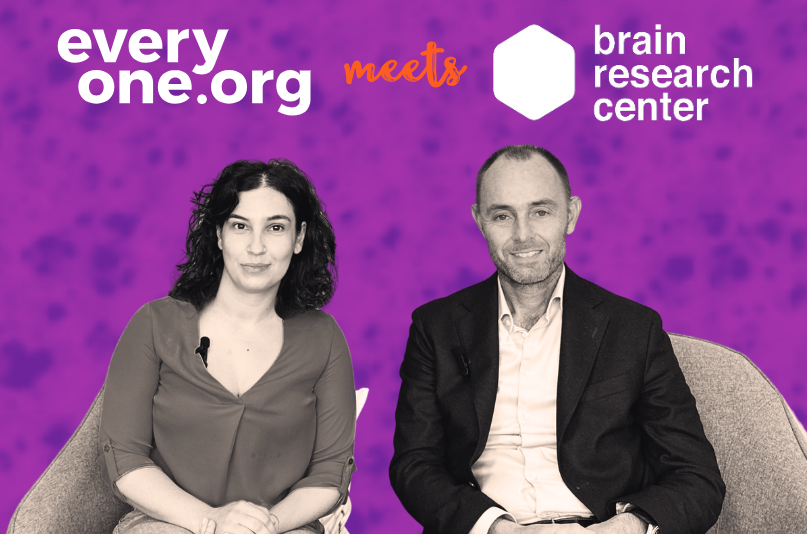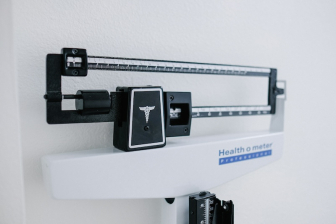Remember There's More: Exploring New Options in Alzheimer's Treatment with Dr. Niels Prins
Last updated: 04 November 2024

You can legally access new medicines, even if they are not approved in your country.
Learn howAt Everyone.org, we’re dedicated to expanding awareness and access to groundbreaking treatments for those affected by Alzheimer’s. Recently, we had the opportunity to speak with Dr. Niels Prins, Head of the Brain Research Center, to discuss the latest developments in Alzheimer’s research. Our conversation touched on the challenges and hopes tied to Alzheimer’s treatments, the importance of spreading awareness about clinical trial participation, and how innovative approaches may offer new pathways for patients and families facing Alzheimer’s.
Everyone.org: Dr. Prins, thank you for taking the time to talk to us. The disease of Alzheimer’s is still not fully understood. What has been your latest learning about the disease - something that surprised you?
Dr. Prins: It’s not so much a latest learning, but what I learned over the years is how complicated and multifactorial the disease is. When I did my basic training, I thought that Alzheimer’s disease was about amyloid plaques and tau tangles, but now we know it’s way more complicated than that and that there are so many factors involved and many different pathways to target with drugs.
Everyone.org: What do you personally think is the most promising Alzheimer’s treatment currently in development?
Dr. Prins: I'm not able to pick a single one. But as I said, there are many different medicines directed at many different targets.
I see that there's a trend of looking at the more traditional targets - amyloid and tau - with novel techniques.
Then, there are also medicines that work on DNA level - so, very novel approaches. At the same time, we see more traditional approaches, like small molecules, being directed at whole new targets. One target, for instance, is inflammation, which also plays an important role in Alzheimer's disease. I see there's a lot going on in this direction.
Everyone.org: Are there any developments in terms of prevention?
Dr. Prins: Also, yes. I think the ideal scenario is to prevent Alzheimer’s disease before dementia sets in. There are several programs targeting people who are not patients yet, but do have an increased risk of becoming patients in the future. These programs try to treat these people to prevent them from getting symptoms.
Everyone.org: Three new medicines for Alzheimer’s have been approved in the world since 2022. All of them are anti-amyloid therapies. Do you believe that this is the most effective approach to slowing down cognitive decline, or would you say that the number of medicines of this type is more a result of Pharma companies competing for market share?
Dr. Prins: It's probably both. I would not say it's the most promising research direction, but it's a direction where a lot of time, effort and money has been invested. There's a long tradition of looking into ways to influence amyloid plaques - to prevent them or, if the plaques have already formed, break them down. It seems like a very logical approach, but we have learned over the years that it's actually quite difficult.
There are now, as you mention, a couple of compounds - all monoclonal antibodies, directed to almost the same target (with small differences in the kind of amyloid they remove). But it's very important to realize that there are many more chemical drug classes that can be of use in treating Alzheimer's, and there are also many more drug targets. It's important that we also spend a lot of time and effort working on these, and not only focus on antibodies against amyloid.
Everyone.org: Some neurologists have shared the opinion that a new breakthrough in the treatment of Alzheimer’s could be a fact within 5 years, but that it most likely would be a combination of medicines rather than one magic pill. What is your take on that?
Dr. Prins: I think the future of Alzheimer’s treatment is personalized medicine. We know that Alzheimer’s is a very heterogeneous disease in terms of genetics, but also in co-pathology. So, I do believe it will be a combination of drugs tailored to the individual characteristics of the patient. That will be the future.
And how long it will take to get there is difficult to predict. We tend to overestimate the progress we can make in 2 years’ time, but underestimate the progress we can make in 10 years’ time. Hopefully, we’ll get there soon, but having said that, there’s still a lot of work to do.
Everyone.org: All the newest Alzheimer’s medicines originate from the USA. Do you think that Europe is in a position to put forward a novel treatment for Alzheimer’s as well, or are we doomed to be second in line?
Dr. Prins: I think it’s good to realize that some of the compounds that are now being marketed by US companies actually were invented in Europe. I hope that Europe will keep on playing an important role in innovation. Having said that, I also think that we must be careful in Europe not to stay behind. Not only behind the US, but also Asia. In China and South Korea, a lot is invested in drug development and we need to step up our game in Europe to keep our position as is.
Everyone.org: Do you think it’s mainly a matter of financing?
Dr. Prins: No, it’s much more. Financing is very important, but it’s also about an innovative mindset and having the right platforms in place in order to drive innovation, as well as organizing, managing, and putting the right infrastructure in place.
Everyone.org: How do you think the Netherlands is doing compared to other countries in terms of Alzheimer’s research and the treatment approaches followed by Dutch doctors?
Dr. Prins: I think the Netherlands has a long-standing good tradition in basic science for Alzheimer’s, as well as clinical research. What we could do better is on the innovation part - more the translation to the clinic. There’s still room for improvement in the way we collaborate between different stakeholders in the Netherlands. For example, public- private partnerships, where I still see some reluctance. I think that is the way forward.
Everyone.org: At the Brain Research Center, you have been involved in multiple clinical trials focusing on Alzheimer’s. What would you say is the biggest challenge in doing research in this field and in the Netherlands?
Dr. Prins: If I had to pick one challenge, I’d say patient recruitment. That has to do with the fact that at this moment, there's still little awareness about the importance and the possibility to participate, and that holds for the healthcare practitioners as well as for the patients and their caregivers. If we could improve that, it would also help for the development of more promising drugs for Alzheimer’s.
Everyone.org: Is participation typically initiated by the healthcare provider or the patient themselves?
Dr. Prins: It can be both. It’s up to the patient to decide whether he or she wants to participate in a clinical trial, based on good information. The caregiver is also very important in that decision. At the same time, there’s a very important role for the medical professional, because they can inform the patient about the possibility to participate.
Everyone.org: As you know, one of the latest approved Alzheimer’s medicines from the USA was rejected by the EMA this year, but it was approved in the UK. Do you feel that the EMA has been overly restrictive with Alzheimer’s medicines, given that there are no disease-modifying treatments available at all in the EU?
Dr. Prins: I would not say that the EMA is too restrictive. I think it's very important to have the right checks and balances in place. And I think everybody plays his or her role in the final approval of drugs. I do worry a little about differences between countries or between regions. I think it can create unrest among patient and maybe even induce medical tourism, which I think is not favorable.
Everyone.org: Alzheimer’s is more common among non–Caucasian ethnicities, and yet the majority of clinical trials on Azlheimer’s medicines focus overwhelmingly on a Caucasian patient population. What do you think are the potential implications of that underrepresentation on the effectiveness and safety of new treatments developed from these trials?
Dr. Prins: If you want to generalize results to the population at large, it’s extremely important that you have everybody represented in your study population. Inequality related to access to clinical trials or access to healthcare in general is a serious problem that fortunately now is recognized, and there are several initiatives to address it. At the same time, it’s also quite challenging, also here in the Netherlands. We see there’s a selection of patients who are likely to participate in a clinical trial, and it’s also correlated with socio-economic factors. That’s also an example of inequality.
Everyone.org: A lot of patients and doctors reach out to Everyone.org looking for ways to get access to the latest Alzheimer’s medicines before they’re available in the Netherlands. Do you think that the European and Dutch healthcare systems specifically are failing these patients and doctors, if they have to go through third parties in order to get medicines they need?
Dr. Prins: I would not say the Dutch system is failing, but the inequality as such is problematic. It would be very good if we could standardize better and, by doing that, prevent these inequalities.
Everyone.org: What message or advice would you like to share with Dutch medical professionals dealing with Alzheimer’s patients?
Dr. Prins: My message would be: Please, think about how you can contribute to getting promising drugs to future patients. One thing is at least inform yourself about the possibilities of clinical trials, and inform your patients about trials running at the moment.
Everyone.org: What message or advice would you like to share with Alzheimer’s patients who are in doubt whether to join a clinical trial?
Dr. Prins: Please contact us with your questions, we can provide you with a lot of information. A clinical trial is definitely not for everybody. In fact, there’s only a minority of patients that are eligible and willing to join a trial. But know that there is a possibility and if you’re interested, reach out to us and we can give you all the information, for free, no strings attached, so you can make an informed decision.
Everyone.org: When we allow ourselves to dream of a utopian future, we imagine a single global medicine approval body that eliminates the medicine access delays we’re seeing around the world now. What is your utopia?
Dr. Prins: My dream is that we will be able, with a combination of lifestyle, prevention, and precision medicine, to treat people before they get symptoms of Alzheimer’s, so nobody will get demented and lose their cognitive functions.
------
We’re grateful to Dr. Niels Prins for sharing his insights into the future of Alzheimer’s treatments and the role of clinical trials in expanding options for patients. If you or someone you know is interested in participating in Alzheimer’s research in the Netherlands, we encourage you to contact the Brain Research Center to learn about current opportunities.
For those seeking early access to promising Alzheimer’s treatments that are not yet available in the Netherlands, Everyone.org is here to help. Get in touch for more information.




